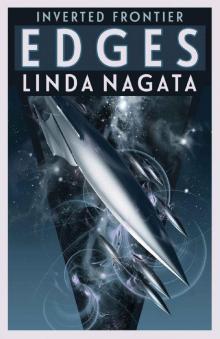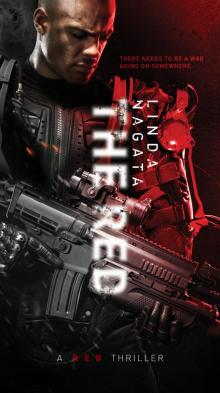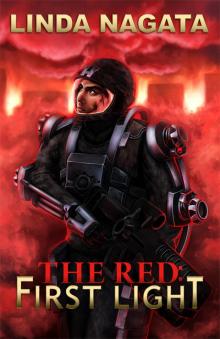- Home
- Linda Nagata
The Last Good Man Page 11
The Last Good Man Read online
Page 11
Miles hesitates. He knows that voice. It’s older now, raspy and scarred, and still, he remembers. He trained under that voice in Ranger School. Lincoln Han. So much has happened tonight that his mind has lost its capacity for surprise. He is a machine, taking in information. No room for anything else. Not yet.
He listens as another man speaks, impatient: “Let’s go, True. Get that gear aboard.”
“Working on it.”
True Brighton. Miles ponders her full name. It’s started to seem familiar, like Lincoln’s voice. Something he’s heard in the past. He’s sure she’s former army, though he can’t remember why he knows that. He aches for a tablet that will let him question the Cloud.
Movement outside the door. A young man, an Arab. Dressed as a civilian, though the MARC visor he’s wearing leaves Miles unconvinced. He comes in carrying a cargo net of supplies. Looks like gear stripped from the truck. True and the big soldier, Jameson, come in behind with more gear, which gets strapped to the cargo tie-downs.
Lincoln Han speaks again. “Go to work on the merchandise, Chris. I want him in shape to answer a few questions while he’s still in our possession.”
“I’m on it, Lincoln,” Chris snaps. Miles recognizes the impatient voice, the one who was pushing True to hurry. Now Chris’s tone communicates irritation—at the close oversight of command?
Been there, brother, Miles thinks.
The engine noise ramps up. A third male voice on the intercom, pilot or crew chief maybe: “Doors closing. Everyone take a seat.”
Miles looks up, to see True eyeing the empty seat beside him. She’s got a rangy build, bulked up by her armored vest, although in the dim light her uniform’s adaptive camouflage works to blur her boundaries. Even the skullcap that confines her thick hair is night camo, leaving only her face to focus on. She takes off her MARC visor.
The red light, he decides, does her no favors, deepening the shadows around her mouth. He is curious to know how old she is, though he’s not dumb enough to ask.
She drops her pack on the floor, unbuckles the flight helmet strapped to the empty seat, and flashes him a thumbs-up and a slight smile as she straps in beside him.
The helicopter lifts, swaying under the pressure of the buffeting wind. Out the window he glimpses the DF-21, headlights muted by dust, heading north again, no one at the wheel.
~~~
Once the transport is airborne, Tamara Thomas leans back in her chair in the ReqOps command post and allows herself a tired sigh. She’s worn out from the stress of shadowing the mission. But it’s almost done. Their preparation paid off. The equipment worked fine, and they got away with no casualties.
She waves off her two young assistants, telling them, “Take a break. Friday will let you know if we get busy again.”
“You should go too,” Lincoln says, not taking his eyes off the wall monitor.
“Not while Blackbird’s in the air.”
Tamara doesn’t anticipate problems with the autonomous helicopter but she wants to observe its behavior and correct any perturbations that might show up. She also wants to review an event that took place in the courtyard.
The photovoltaic boxes were an unknown going in. Tamara guessed they housed the components of a defensive swarm. True had come to the same conclusion, so Blackbird was instructed to take them out before the QRF went over the wall. Only a single component survived long enough to launch. True saw it. It targeted her—and that gave her MARC a chance to capture it on video—a streak of motion moving too fast for details to be perceived.
Tamara hunts down that scrap of video, replays it on a desk monitor, slowing it down, studying each frame.
None of the frames are clear, but she makes out a flattened diamond-shaped fuselage, and tilt rotors on long swept-back wings.
The design stirs a sense of recognition. She runs an image search, trying to identify the model, but finds no matches. She tries a relational search, looking for UAVs that share a design heritage. That produces several results, all based on an early kamikaze developed more than five years ago by the Chinese defense contractor Kai Yun Strategic Technologies. Back when Tamara’s colleague, Li Guiying, still worked for Kai Yun. It was possible, even likely, that Guiying had contributed to the design.
Tamara hisses softly, troubled at the way ideas travel and how they evolve. The Kai Yun device had a larger fuselage, and shorter wings set on ball joints. Its reported top speed didn’t come close to the device in the video—but it’s been five years.
Tamara considers sending the video segment to Guiying. She might be curious to see how the design has advanced. Tamara hesitates only because Guiying is sure to ask about the origin of the recording: where and when it was captured, under what circumstances, how the device performed, and if it was successful…
It came close to being successful.
Tamara shivers, frightened by what might have been. In an alternate timeline, where the PV boxes were hidden, the swarm might have survived to launch an attack. Under that scenario, the QRF could not have reacted fast enough to successfully defend themselves. They would have been overwhelmed.
She holds off on sending the video to Li Guiying.
Better to wait until after news of the raid goes public.
Rogue Lightning
Lincoln watches Blackbird’s position shift north across the three-dimensional map, drawing closer to the wreckage of the downed Arkinson. With the wind behind it, the little Kobrin 900-s moves swiftly despite the drag caused by Juliet riding on the tether.
Displayed alongside the map is a feed from the helicopter’s infrared nose camera. It shows a desolate plain cluttered with grit and stone, a line of barren hills ahead, and at the foot of those hills, the white-hot signature of burning fuel.
The appearance of the three Arkinsons is a puzzle that needs to be solved. None of ReqOps’ pre-mission intelligence suggested Hussam controlled a sophisticated robotic air force. The absence argues for the existence of a third party, a hired gun with the resources and discipline to mount a serious response at a few minutes’ notice.
Know your enemy.
Lincoln hopes to find clues in the wreckage that will tell him who that hired gun is.
It’s a risk, of course. This side trip is going to chew into Blackbird’s fuel, and if the two surviving Arkinsons return, Juliet will make an easy target. But Lincoln still has high-altitude eyes on the region. That will buy some warning time—enough for the Hai-Lins to circle back and engage.
Juliet speaks over comms. “Coming up on the debris field.”
“Roger that.”
A Hai-Lin overflew the crash site earlier, mapping debris strewn over two hundred meters. Lincoln mutes his mic. “You watching, Hayden?” he asks his young data wrangler.
Hayden flashes him a thumbs-up without turning around, repeating Lincoln’s earlier instructions: “We’re looking for identifying numbers, stickers, stuff like that.”
“Exactly. But if you see anything you think is worth mentioning, mention it.”
“Yes, sir.”
“I’m watching too,” Tamara says from her desk.
He glances at Renata. She’s still strapped into the recliner, using the mediums of her VR goggles and black-lace gloves to guide the Hai-Lins as they escort the contracted transport helicopter.
Juliet speaks again: “Looks like the tail section.”
Lincoln taps his mic back on, returns his attention to the monitor. Blackbird moves slowly, a hundred fifty feet above the desert. Its camera swivels, zooming in on a charred tail section embedded in a shallow trench plowed into the hardpan.
“Blackbird,” Juliet says, “circle it.”
Blackbird obeys, flying slowly around the object, recording it from all sides.
“Burned clean,” Tamara says. “I don’t see any identifiers.”
There’s no time to pull the wreck apart, look for serial numbers, so Lincoln says, “Juliet, move on. Let’s take a look at the rest of it.”
&nb
sp; “Blackbird,” she says, “survey next target.”
Blackbird advances to circle a broken fuselage, crushed wings, and fire-blackened engines with low flames still flickering where fuel has soaked into the ground.
Hayden says, “I’ve got nothing, Lincoln. No numbers, no marks. If anything was there, it must have burned off. Wait—”
Lincoln sees it too: the edge of what might be a circular emblem. It’s on a torn section of fuselage facing away from the fire. “Juliet, have Blackbird circle that section again, try to get in closer. We’re looking at an emblem on the fuselage.”
She repeats the instructions for Blackbird. The helicopter descends. As it does, Juliet disappears in a cloud of dust stirred up by the rotor wash. “Pull up!” Lincoln snaps. “We cannot risk engine failure.”
Blackbird rises again as the wind carries the dust away.
“Blackbird,” Juliet says, “switch on your searchlight. Let’s see if that shows us anything.”
Lincoln almost aborts the command—operating under lights always feels wrong to him, going against years of training—but he catches himself. Juliet is alone out there. High-altitude surveillance shows no other activity.
The bright beam of Blackbird’s searchlight flashes on. It strikes the wreckage, finds the emblem. The curve of the fuselage hides most of it. Lincoln can see only the top of the design—twin lightning bolts intersecting a dark border—but that’s enough to make him feel like he’s just stepped off the map into unknown territory haunted by ghosts.
“I need to know what that is,” he says in a clipped voice.
“Roger that, boss,” Juliet answers. “I’m going to descend.”
Lincoln checks the fuel. “You’ve got a three-minute margin before you need to head north,” he warns her.
“Not a problem. Blackbird, put me on the ground.”
The helicopter maintains its elevation but unspools the tether, lowering Juliet until she can step off the troop carrier. Hayden adds a feed from her helmet cam to the command post display.
Juliet is careful not to block the searchlight’s beam as she crouches to look at the emblem. The wash of white light reveals all of its familiar details: a half-circle split into three sections by angled lightning bolts, spangled stars in the dark-blue outer fields, a bright orange sun in the center, and across the base, a name and a motto: Rogue Lightning – Anywhere, Anytime.
At the sight of it Lincoln shudders. Preternatural dread. His skin puckers, pulling unevenly at his scars, the pressure defining their shape, their presence, reminding him of things he’s tried to forget.
Juliet doesn’t share his turmoil. She just sounds puzzled. “That’s your emblem, boss. What’s it doing here? One of your guys on the other side now?”
His answer is terse and unhesitating. “No.”
For three years Lincoln commanded Rogue Lightning, an elite Special Forces unit. “Rangers Squared” as their original commander, Shaw Walker, described it. The unit was dissolved after Lincoln’s career-ending injuries, but he keeps track of the surviving veterans. Jameson and Chris work for him. All the others moved on to new postings or civilian life. “Someone copied it,” he assures Juliet.
But the Rogue Lightning emblem, stolen and displayed out of place, has shaken him. He wants to know who’s behind it. He wants to put a name on his enemy.
“How’s the heat from the fire?” he asks.
“Not a problem. It’s a cold wind.”
“Okay. I’m giving you ninety seconds. I want you to take a look inside the fuselage. You see any electronics?”
Juliet climbs the wreck, looks inside. “Oh hell yeah. Mother lode. I’ll grab the drives.”
“Fans and filters too.”
“Serious?”
“They’ll contain microbiota. Could tell us where it’s been, where it came from.”
“Got it.”
“Make it quick.”
“Smash and grab. No problem.” With ruthless efficiency, Juliet snaps drives out of their mounts, rips out filters, shoves it all into shielded collection bags. She clips the bags to her backpack.
“Nice job,” Lincoln tells her.
“Did I make my time?”
He checks the clock. “You’re only twelve seconds over.”
“Shit.” She steps onto the troop carrier’s little platform and hooks into a safety line. Automatic straps close over her boots.
“Get the hell out of there,” he tells her.
“Blackbird, you heard the boss. Move out, best speed. Rest stop one.”
Lincoln checks the map, confirming that Blackbird has plotted the correct route. Juliet will be checking too, using her heads-up display.
The 900-s responds, ascending straight up as it shortens the tether to cruising length. Then the craft turns north and lays on the speed. Juliet soars beneath it at the end of the curving tether, drawn almost prone by the wind.
“I’m taking a break,” Lincoln announces in an angry growl. He heads for the command post door.
Tamara turns around, startled by his tone as much as by his sudden departure. The door closes behind him. When the latch clicks shut, Hayden says, “It was the emblem.”
Tamara turns to him. He’s a slightly built nineteen-year-old, fair-skinned and dark-haired, into video games and military history. Someone—maybe True?—said that he wanted to enlist in the army, but a severe allergy kept him out. ReqOps was almost as good. “You think?” she asks him. “He didn’t seem bothered by it.”
Hayden looks at her as if she’s clueless. When it comes to reading people’s moods, sometimes she is. “It was Rogue Lightning,” he says. “That means everything to him.”
Does it?
Tamara considers this as her gaze drifts up to the display. They’ve still got a high-altitude camera on the highway outside Tadmur. It shows a sedan and a small pickup truck stopped near the wreckage of the two technicals, with five individuals on foot exploring the debris field. A motorcycle from out of Tadmur approaches the vehicles, stopping fifty meters away. Tamara watches curiously, wondering if these people are friends or scavengers.
The motorcycle rider might not be either. He doesn’t join the searchers. After thirty seconds or so, he rides on—fast—away from Tadmur. He pours on the speed like he’s trying to catch up with the DF-21. That won’t happen, but Tamara gives her assistant, Naomi, the task of tracking him anyway. “Let me know what he does.”
~~~
Lincoln paces the hallway outside the command post. He still wears his headset, still listens to the chatter of ongoing communications, but he’s granted himself a minute alone to settle his anger. His boots strike the floor in strict cadence. It’s a display of discipline and control contradicted by the tremor that infects his hands—both the real one and the prosthetic.
In his mind the Rogue Lightning emblem is sacred, paid for in blood by men who risked their lives and who sometimes died doing work that was dark, remote, ruthless, and essential. Lincoln inherited command of the unit when Shaw Walker was killed with Diego Delgado and four other men. Lincoln rebuilt Rogue Lightning. He recruited new men, including Chris and Jameson, and for three more years they did what needed doing.
Then their gunship went down and Lincoln’s injuries were severe enough to end his army career.
He thought a new commander would be named, new men recruited, that Rogue Lightning would go on. But instead the unit was dissolved and their emblem retired.
So what the hell is it doing decorating an otherwise anonymous Arkinson? One flying in defense of a murderous outlaw like Hussam?
He tells himself it doesn’t mean anything. Someone stumbled across it, liked the look, and copied it, that’s all—and it’s not important to the outcome of the current mission.
He stops pacing. There is work to do. Phone calls to make. A procedure needs to be in place for transferring Hussam to American authorities.
He returns to the command post. There will be time for more questions when the mission is done.
Verbal Sparring
True closes her eyes as the H215 levels off. She lets herself rest, just for a few minutes. She tries to relax. But snippets of memory pop up in her consciousness: the dark glittering surface of the anti-surveillance canopy; the crunch of glass and mechanical fragments under her boots; the hair-raising buzz of the defensive mech that targeted her; the pak! of Blackbird’s precision kill shot… and her sense of a consolatory success as Miles—then Ryan and Dano Rodrigues—emerged from their stinking cell.
Ah, Diego.
Just that. A short, silent internal sigh. No more than that. She’s learned to go lightly past those memories. Circle around, back to the here and now.
We take the victories we are given.
Her eyes blink, her chin lifts. She stretches her shoulders, acknowledging to herself that the mission was a victory. It went well. It went as planned… almost. The Arkinsons were a surprise, but the team was prepared for surprises. Preparation translated to survival—and success.
She loosens her harness and leans forward to check on the men in front of her. The Brazilian doctor is nodding off. Beside him, the engineer, Ryan Rogers, sits in perfect stillness, staring at nothing, like a man worried that the least wrong move could shatter the illusion that contains him.
She turns next to Miles, sitting beside her. His posture is tense. He’s got one hand tight on the buckle of his harness like he’s about to release it and spring out of his seat. He notices her gaze, returns it. His olive-drab flight helmet frames his bearded, dust-encrusted face. Behind the mic, his cracked lips move, asking, “Where to now?”
His question goes out over the intercom, as does her answer. She tells him, “It’s under negotiation, but we’ll probably take you as far as Cyprus.”
He nods. “Sounds good. We can get home from there.”
Rogers comes in over the intercom, voice hoarse, not quite steady. “Hey. I just want to say thank you. Thank you to everyone involved in this. Thank you for getting us the fuck out of that subbasement of Hell. Seriously, man. I’d owe all of you my firstborn, if I had one.”

 Nightside on Callisto and Other Stories
Nightside on Callisto and Other Stories Pacific Storm
Pacific Storm Edges
Edges The Red
The Red The Red: First Light
The Red: First Light The Martian Obelisk
The Martian Obelisk Limit of Vision
Limit of Vision Going Dark
Going Dark The Last Good Man
The Last Good Man The Trials (The Red Trilogy Book 2)
The Trials (The Red Trilogy Book 2) Deception Well (The Nanotech Succession Book 2)
Deception Well (The Nanotech Succession Book 2) The Year's Best Science Fiction & Fantasy 2013
The Year's Best Science Fiction & Fantasy 2013 The Dread Hammer
The Dread Hammer Skye Object 3270a
Skye Object 3270a The Bohr Maker
The Bohr Maker